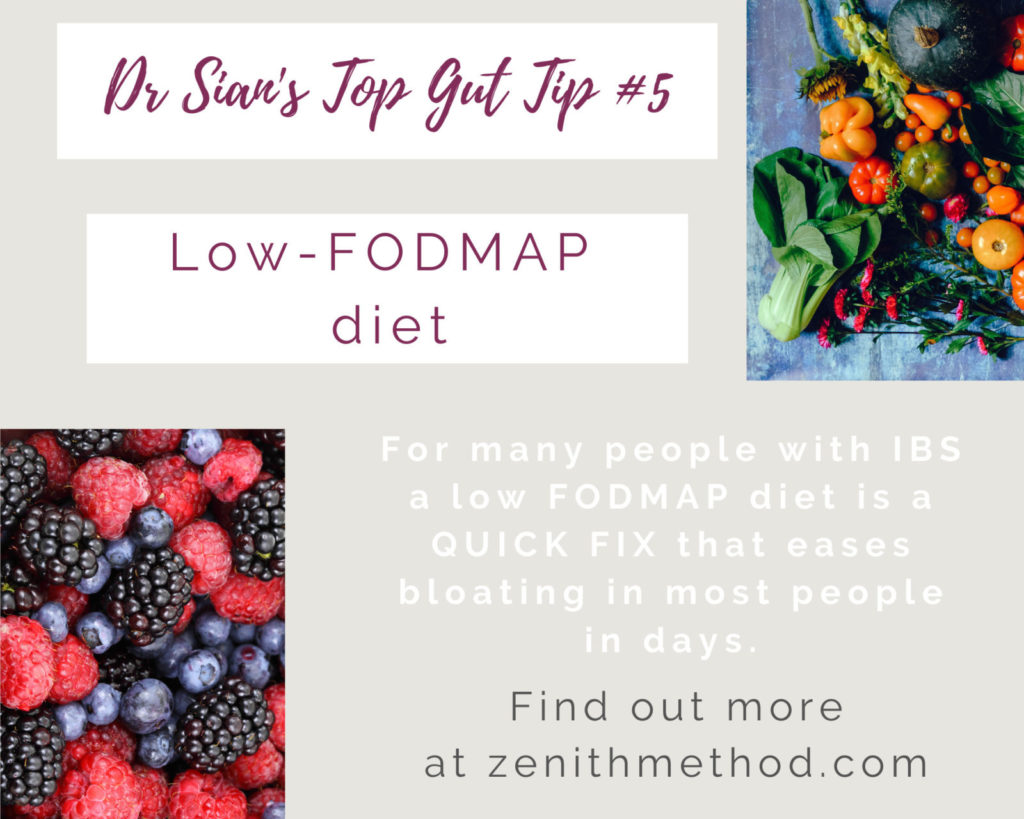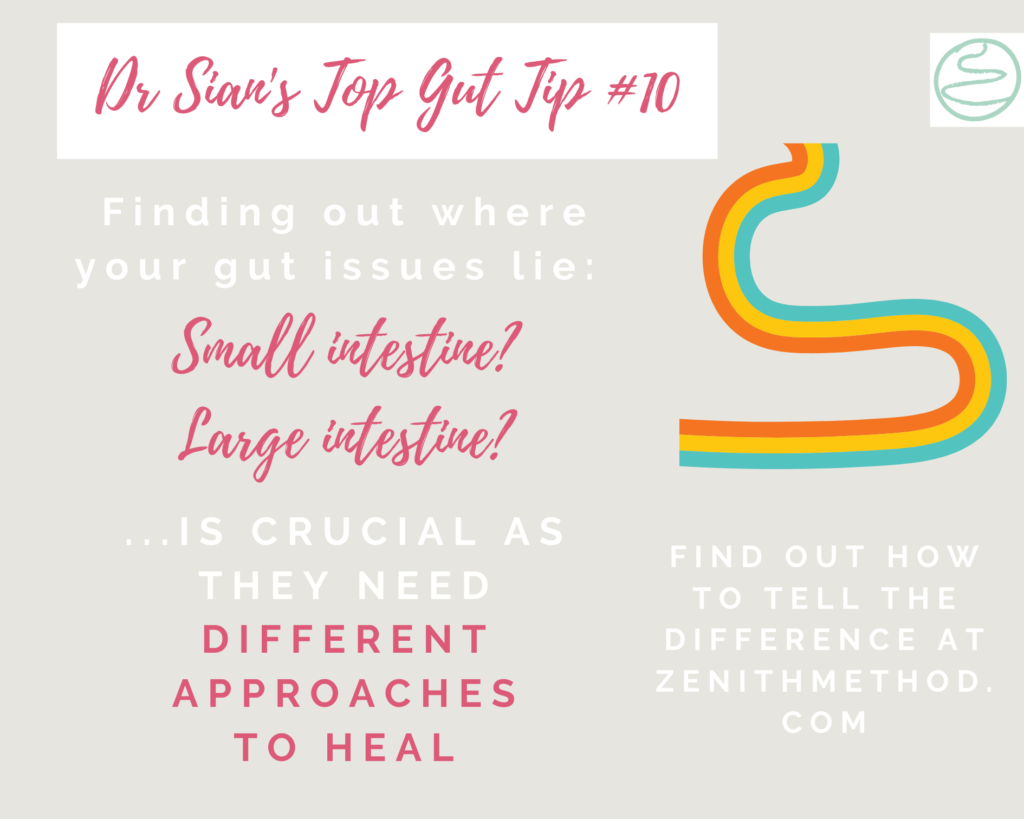... a healthy eating style that is in harmony with your body and mind, being gentle on your digestion so healing can begin.
The ‘restore’ element is all about putting in place a diet that is in harmony with digestion, meeting your health where it is now.

The ZM approach to food is also in harmony with what our body has evolved to understand. It’s the diet associated with long-term health and wellness, but modified for those of us with gut issues.
Good digestion. Bad digestion.
Around 1 in 5 – or more – people in the West have digestive issues. This can mean moderate to severe intestinal pain, chronic constipation, chronic diarrhea or both. Many people find their ‘tummy troubles’ start after a variety of situations such as surgery, an obstruction of some sort, a course antibiotics, a tummy bug or in midlife after decades eating a poor diet.
How comfortable our gut feels is influenced hugely by what we eat.
Most people will feel healthier on diet that is high in vegetables and fruit, with moderate amounts wholegrains, protein sources and fat.
But if you have IBS, it is common to find that the healthier your diet, the more digestive issues you have. Why? The answer lies in our microbiome and intestinal inflammation… but more on that later.
Can the Zenith Method help?
Supporting the work you’re doing with your physician or practitioner, the Zenith Method (ZM) will recommend a personalized food plan that meets your digestive system where it is now. Your will have a meal plan that fits with your lifestyle, preferences – and is easy to digest.
If you have IBS, your intestines will be sore – inflamed. So, a key part of the ZM program is to calm the inflammation of your intestinal lining.

Changing your diet and reducing inflammation will reduce bloating, reduce digestive ‘irregularity’ and begin to restore normal gut function.
How to begin gut healing
An easy first step is switching to a low FODMAP diet.

There is a version of the low FODMAP diet for everyone, whether you are meat lover or fully vegan!
The diet should not be followed in its strictest sense long term, but in the short term [a few weeks], it can provide almost immediate relief, if done properly.
The gut microbiome
A healthy gut is essentially microbe free in the stomach and small intestines, and has a balanced and diverse set of microbes in the colon (large intestine).
If this is you – then that’s fantastic! You don’t need the Zenith Program for Optimal Gut Health.
For the rest of us, let’s dive a little deeper…
An imbalanced microbiome
Usually called ‘dysbiosis’ this is situation where the complex communities of microbes in your gut are out of balance – that is, there are too many of certain types and too few of others. This can arise after a variety of situations such as surgery, an obstruction of some sort, a course antibiotics, a tummy bug or a poor diet.
The two main types of dysbiosis: SIBO and large intestinal dysbiosis
Broadly speaking [and this is an oversimplification] IBS is usually related to one of two issue – either an overgrowth of microbes in the small intestine (SIBO) of an imbalance of microbes in the large intestine.

Large intestinal dysbiosis
This is an imbalance of microbes in the large intestine.
A healthy colon is choc full of a hugely diverse range of microbes. The more diverse our diet, the more diverse our microbes.
Modern diets tend to be low in veg and high in processed carbs, both of which reduce microbial diversity in the colon and can lead to inflammation.
Why inflammation in the gut is such a bad thing for our health
80% of the cells of our immune system reside in the gut tissues. Think about it: what is the biggest threat to our health? The food we eat.
From the standpoint of human evolution, everytime we eat, we put our bodies at potential risk of unsafe food. So our immune system monitors what we eat constantly.
Long-term inflammation can cause this amazing system to malfunction, become oversensitive – meaning that we can get diarrhea when we don’t have an infection – or we have the opposite problem (consitpation).
SIBO
SIBO is an overgrowth of microbes in our small intestine.
Once established it can be really tough to clear up completely, especially if it’s been around a long time.
The small intestine is almost completely microbe free. It’s kept this way by a powerful ‘cleansing wave’ that, around 2 hours after a meal, sweeps through the entire length, squeezing any remaining food out and into the large intestine.
Because the small intestine is essenially empty most of the time, microbes never become established.
Unless…
Something interfers with this cleansing wave, such as gastroenteritis, surgery, among other thing.
Running behind schedule

A bit like a train running infrequently on tracks over days or weeks, when small intestinal transit time is slowed stuff starts to accumulate – in this case, microbes. The delicate small intestine lining isn’t equipped to deal with the increased microbial load and becomes inflamed – and stops working correctly.
This inflammation can cause even more delays in cleansing wave, and so the vicious cycle begins.
Symptoms of SIBO
Depending on which microbes are dominant in the SIBO, symptoms can include:
- constipation
- diarrhea
- alternating constipation and diarrhea
- deep fatigue that is not eased by sleep
- poor sleep quality
- bloating soon after eating [within 15-30 minutes]
- discomfort or abdominal pain
How can the ZM help?
Supporting the work you’re doing with your physician or practitioner, the ZM provides personalized meal plans that can help to calm your digestive system tissues and reduce bloating. The meal plans recommended will reduce the levels of problematic foods while still eating delicious and healthy meals.

